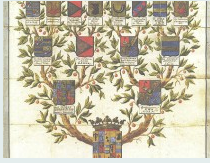
Rookies are poor note keepers
Rookie family group records have meager source citations, and are limited to births, marriages, and deaths. Their research logs often consist of small slips of paper tucked into the pages of a spiral notebook. They have a tendency to make handwritten copies of sources. Their copies of sources are scattered and poorly organized. Finding a particular document may take 5 minutes or more.
Consequences: Poor organization and note keeping often results in redundant searches, missed documents, overlooked clues, poor correlation and analysis, incorrect conclusions, dead ends, and false connections.
Experienced researchers document AS THEY GO, keeping up-to-date, well-
source-footnoted family group records, and
research logs. Veterans make
photocopies of sources whenever allowed by the repository. They
add all events including things like each census, military service, and family moves to their
family group records. They are
well organized. Thanks to their research log they can have any document copy about the family in their hand in moments. They use their records, especially the family group record, as their best source of ideas about where to search next because of all the clues they have packed onto it. They use their research logs to document their research strategies as well as the sources searched.
Rookies assume an ancestor’s name has only one correct spelling
Rookies may reject sources that show the ancestor’s name spelled differently than expected. They often insist the family has always spelled the name just one way. They may be uncomfortable with variant spellings because they assume different spellings are a sign their ancestors were uneducated. They overlook the possibility that it was a clerk (not family) that spelled the name differently.
Consequences: Missed sources, missed opportunities, missed clues, incomplete and stunted genealogies.
Experienced researchers would find it unusual if they found only one spelling in all of the records for a particular person. They expect and actively seek out as many
variant spellings of the name as possible. Experienced researchers look for names under middle names, initials, abbreviations, and
nicknames. They use the
International Genealogical Index to find alternate spellings to surnames. And they use
spelling substitution tables to figure out even more possible alternates spellings of the surname.
Rookies often have vague research goals
Rookies often have little focus and act scatterbrained. When questioned about the person and event they seek, a rookie may not have anyone specific in mind. They just want to find ancestors and have no one in particular. Further, they are often without a family group when they ask questions.
Consequences: Lack of focus means a rookie is unlikely to stay on task. They often cannot figure out sources to search. Therefore their general focus often results in general lack of progress.
Experienced researchers work on
one specific event in one person’s life at a time. They can name the person and event, such as, “I want to document Katie Beller’s birth.” The nature of the event suggests a variety of sources that might have information about that event. Further, veterans carry with them a
well-documented family group record showing that individual ancestor so the researcher can review the clues. They tend to continue to research that one event in one person’s life until they find it.
There are more: Click here to see um
























